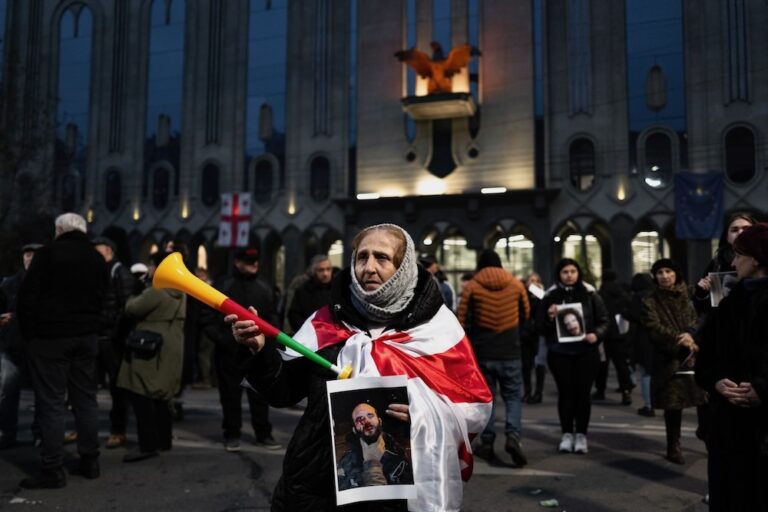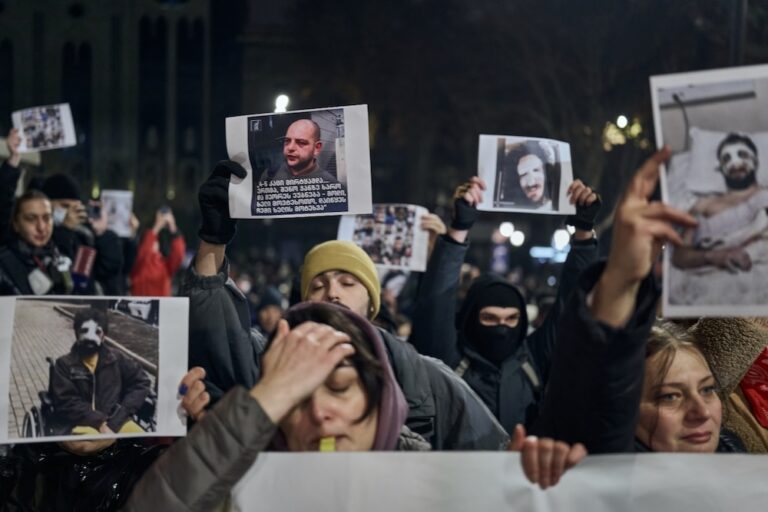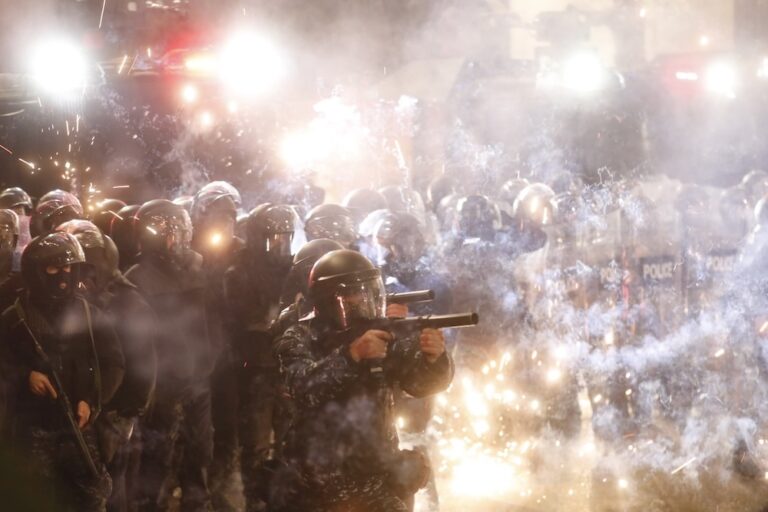(IPI/IFEX) – In a 31 October 2001 letter to Georgian President Eduard Shevardnadze, IPI expressed profound concern about the recent harassment and intimidation of the television station Rustavi-2. According to the information before IPI, on 31 October, Rustavi-2, an independent television station based in Tibilisi, was besieged by a large contingent from the ministry of […]
(IPI/IFEX) – In a 31 October 2001 letter to Georgian President Eduard Shevardnadze, IPI expressed profound concern about the recent harassment and intimidation of the television station Rustavi-2.
According to the information before IPI, on 31 October, Rustavi-2, an independent television station based in Tibilisi, was besieged by a large contingent from the ministry of security who positioned themselves outside the offices of the station. Their subsequent progress was blocked by several hundred demonstrators who sought to prevent the security forces from entering the street where the TV station building is situated. Staff at Rustavi-2 and a related organisation, Georgia online, were forced to lock themselves in the building.
The attempted raid on the offices is not the first such act. Two weeks ago, the television station was the subject of an intensive tax inspection which failed to uncover any wrongdoing and, on 30 October, members of the ministry of security entered the building and talked to staff. During the two hour discussion, staff were told to hand over financial documents and that a refusal would lead to the use of special forces who were waiting in support. Fortunately, cameras at the television station were able to capture the raid live on television and, as a result, demonstrators converged on the building, forcing the members of the security ministry to leave empty handed.
In a statement, the state security ministry said, “What happened at Rustavi-2 today has no political background and is linked to the economic side of the TV company’s activities.” Responding on behalf of the television station, Erios Kintsmarishvili, a co-founder, said, “What happened is being done on the political orders of those in power.”
Events surrounding the television station led to demonstrations outside the parliament building and, on 31 October, shortly after midday, the minister of security, Vakhtang Kutateladze, offered his resignation due to his role in the raids.
The actions of the ministry of security are thought to be connected to the television station’s news broadcasts and its political programmes. In its broadcasts, Rustavi-2 has been a constant critic of the Georgian government and President Shevardnadze. In particular, the television station has been highly critical of the Georgian economy and the on-going conflict in the breakaway republic of Abkhazia. Rustavi-2 has also broadcast news stories highlighting the possibility that Chechen rebels may be hiding in the country.
Over the last eighteen months, the television station has faced a number of direct and indirect pressures. In the early part of last year, Akaki Gogichaishvili, who anchored the “60 Minutes” programme on Rustavi-2, was the recipient of a series of threats from businessmen and officials. On 19 May 2000, Gogichaishvili held a press conference in Tbilisi, in which he stated that his life had been threatened and that he had been told to leave the country. In the most disturbing incident, on 26 July, Georgi Sanaia, a newsreader at the television station, was murdered by an unknown assailant. At present, there have been no prosecutions in this case.
Many commentators in Georgia believe that the present raids on Rustavi-2 and the death of Sanaia are intimately connected. Before his death, Sanaia and his reporting team had been investigating the situation in the Pankisi Gorge, bordering Chechnya, which is thought to be a refuge for Chechen rebels. Journalists at the station were seeking to confirm this fact and claims that drugs were being smuggled from the valley into the rest of Georgia. While carrying out research they became aware of the existence of videotapes, one of which allegedly showed a member of the Georgian authorities in the Pankisi Gorge on an unknown mission.
Sanaia presented these stories in a series of talk shows and was known to be aware of the existence of the tapes. On 2 September, the popular Rustavi-2 programme “60 Minutes” covered these stories and made a direct link to the murder of Sanaia. The programme caused considerable consternation among government ministers.
On 29 October, in a telephone conversation with the general manager of the channel, Nick Tabatadze, Interior Minister Kakha Thargamdze said the television programme had gone too far and should be taken off the air and that, if it failed to do so of its own accord, soldiers would do it for them. He then threatened the possibility of a further investigation into the television station’s financial affairs. In a press conference on 30 October, Thargamdze confirmed this threat when questioned by a reporter from Rustavi-2. On the same day, the deputy interior minister, Zurab Chkhaidze stated that the ministry had filed a criminal action against the television station.
Based on the above observations, it is entirely possible that the activities of the ministry of security are designed to apply pressure on the television station to halt its investigations into these matters or, alternatively, to seek the actual videotapes. There is additional proof for the existence of the tapes in that the head of the Georgian human rights committee, Helen Tevdoradze, recently claimed, in a television interview, that she had possession of the tapes and that they had been deposited at the European Parliament.
Recommended Action
Send appeals to the president:
– condemning the raids on Rustavi-2
– noting that, in the event that the purpose of the raids was designed to search for financial information, the use of the security forces is both heavy handed and amounts to an unwarranted intrusion in the activities of the media organisation
– expressing the opinion that where there is a need for financial information, the best way to secure such information is to invite Rustavi-2 to hand it over or to apply for it through the proper legal channels
– expressing the opinion that the raids disclose an ulterior motive in this case
– reminding him that the media occupy an important position within society and that the free flow of information is essential to any democracy
– further noting that the media have a crucial role to play in exposing government corruption and revealing important stories, no matter how embarrassing
– inviting him to ensure that there is no resumption of the raids on Rustavi-2 and that the media organisation is allowed to report on news free of all government interference
– asking that he hold a full and proper investigation into the murder of Sanaia and the alleged existence of the tapes, and that the conclusions of the investigation are made public
– recalling that it is only with a commitment to total disclosure that matters such as the despicable murder of Sanaia will be resolved
Appeals To
H.E. Eduard Shevardnadze
President
Republic of Georgia
Tbilisi, Georgia
Fax: + 995 32 99 86 90Please copy appeals to the source if possible.


